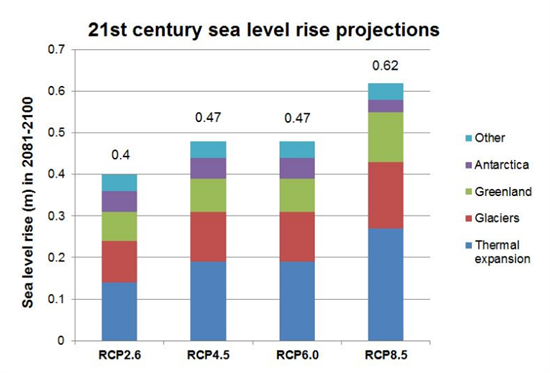
Image by Carbon Brief, created using data in Table 13.5 - Chapter 13 of the IPCC's Fifth Assessment Report. | Under all scenarios, the expansion of water as it warms is the biggest cause of sea level rise - accounting for between 30 and 55 per cent of the increase. The oceans have absorbed more than 90 per cent of the heat trapped by greenhouse gas emissions since the 1970s. As temperatures rise, more heat will enter the sea, which means water will expand further.
Glacier melt is predicted to be the next biggest contributor to future sea level rise. Glacier melting is already speeding up and almost all the world's glaciers are shrinking, says the IPCC. Under the highest emissions scenario, RCP8.5, ice loss from glaciers could drive sea levels up by as much as 16cm by the end of the century.
Melting of the Greenland ice sheet, including surface melt, is expected to be the next biggest driver of sea level rise. Like many other ice-covered regions, Greenland's ice loss is speeding up. Between 1992 and 2001 the ice sheet was losing 34 billion tonnes of ice per year, but between 2002-2011 that increased six-fold to 215 billion tonnes per year. Under the highest emissions scenario RCP8.5, Greenland's shrinking ice is expected to raise sea levels 12cm by the end of the century.
Projecting future ice loss from Antarctica is harder, as different regions of the ice sheet are changing in different ways. While solid ice is being lost from parts of the Antarctic Peninsula and in West Antarctica, the surface of the ice sheet is gaining mass as more snow falls on it. Overall, though, models predict it will cause sea levels to rise by about 5cm in most scenarios.
Higher sea levels are possible
Sea level rise of between 26 and 82 centimetres is the range the IPCC considers likely. The report doesn't rule out the possibility of higher sea levels, but says there isn't enough evidence to say what the chances are.
The likely estimates come from models that simulate all the known processes that contribute to sea level rise - and how those processes are likely to be affected if temperatures continue to rise.
Another set of models take a different approach - they look at how sea levels have changed In response to warming in the past and extend the relationship forward in time. These models give much higher projections for how much sea level rise we can expect by the end of the century - up to twice as large as the IPCC report states.
At the moment, however, there is very little agreement among this type of model. So while the new report discusses their estimates, scientists don't consider them reliable enough to include in the overall assessment. |